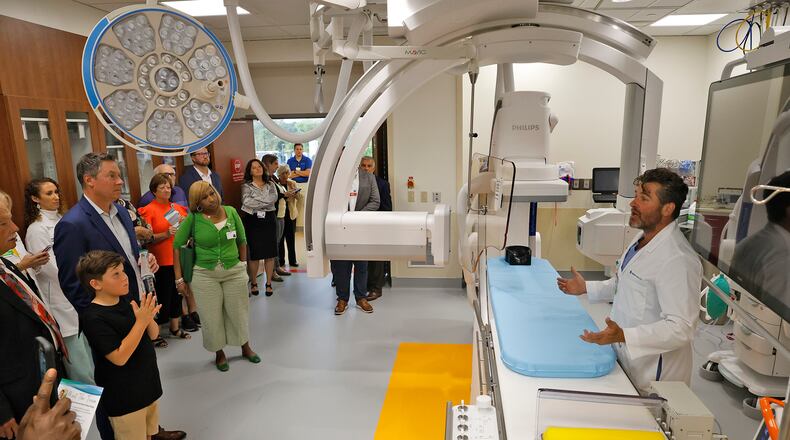“The opening of this suite highlights our commitment and investment in neurological and stroke care in our community,” Chase Collins, the hospital’s director of neurosciences, said in a release. “It’s going to greatly reduce the time to intervention. Without this suite, patients would have to be transferred to Dayton or Columbus. The biplane combined with our highly specialized providers means stroke and other neurovascular conditions can be treated right here in Springfield.”
The camera takes detailed photos of the patient’s brain and its blood vessel from two different angles, which decreases the time it takes to complete a scan that shows blood flow through arteries and veins, according to the release. This allows doctors to study the brain without exposing patients to radiation, and there is a lower risk of bleeding and infection.
The cameras rotate on each side of the patient to take 2D and 3D images to make it easier to spot clots and identify aneurysms. Doctors will be able to start stroke care earlier, which will lead to better outcomes like preventing permanent damage and lowering the risk of long-term disability, according to the release.
“This technology will provide real-time images and allow our team to combine diagnosis and treatment into one procedure. This saves precious time in a situation where every second can make all the difference,” Collins said in the release.
Credit: Bill Lackey
Credit: Bill Lackey
Stroke is the second-leading cause of death in Clark County and the third in Champaign County, Dr. Jody Short, an interventional neurologist at the hospital, said in May.
The most common type of stroke is ischemic, where a clot blocks blood flow to the brain, Short said. Other strokes are typically hemorrhagic, in which a blood vessel ruptures and bleeds in the brain, which can be toxic.
According to the American Stroke Association, a stroke can cause symptoms including one-sided paralysis, speech or language problems, vision impairment, changes in behavior and memory loss. An untreated stroke can result in more long-term disabilities or death.
Mercy Health began a partnership with the Springfield Fire Rescue Division earlier this year to reduce the amount of time it takes a person having a stroke to get life-saving treatment, with several trainings focusing on the best practices for identify a stroke, where to take a patient for the best care and information to share with the receiving hospital.
The Springfield hospital is a Stroke Gold Plus achievement award recipient, meaning its stroke patients receive “the most appropriate” care in line with nationally recognized and research-based guidelines, according to the release. The hospital also partners with the Ohio State Medical Center to make sure a board-certified stroke neurologist is always available.
About the Author

